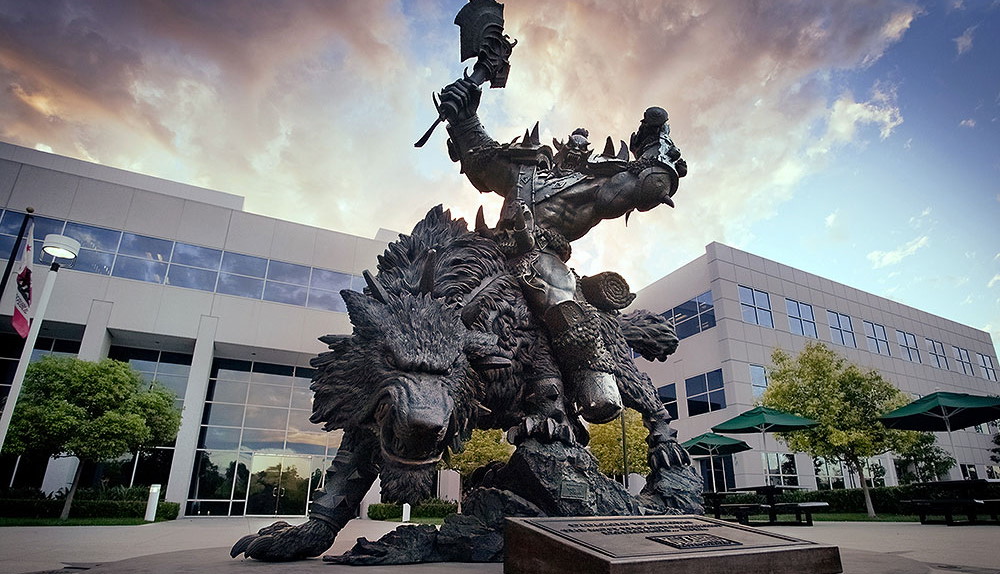Blizzard morale takes a hit following co-leader's surprise resignation
Activision Blizzard reported big earnings, but the consequences of high-profile exits may continue to manifest.

On Tuesday, Activision Blizzard announced its financial results for the period that includes the July filing of California's discrimination and sexual harassment lawsuit and the immediate aftermath. The headline for investors is that the company's revenue outlook for the end of the year is weaker than analysts projected, but it beat its third quarter forecast with net revenue of $2.07 billion, improving year-over-year with help from Diablo 2: Resurrected.
Finances felt like the call's secondary topic, however, as Activision Blizzard's leaders reiterated plans to overhaul recruiting and HR practices, and surprised employees with the news that Blizzard co-leader Jen Oneal is stepping down. The resignation came as a shock, and according to some has wounded morale at Blizzard just as it was starting to improve.
Last week, Activision Blizzard finally responded to a list of demands issued in July by the employees who organized a walkout. The company partially conceded to the demand to remove mandatory arbitration from employment contracts, agreeing to strike it for "individual sexual harassment and discrimination claims." Among a number of other things, Activision Blizzard has also promised increased pay transparency, recruiting policies that foster diversity, and a "zero-tolerance harassment policy," which will result in immediate firing and "forfeiture of future compensation."
A source inside Activision Blizzard told PC Gamer this week that they witnessed an overall positive response to last week's announcement. The timing was seen as suspect—the demands were acknowledged just in time to become talking points during Tuesday's investor call—but the partial win on arbitration was seen as a clear accomplishment, and the diverse recruiting policies reflect what individual Activision Blizzard teams have already been implementing without waiting for a corporate mandate. One thing still seen as missing is third-party oversight of hiring and HR practices, including by a committee chosen by employees, but the mood leading into the earnings call was certainly better than it was following a mistrusted email from executive Fran Townsend earlier in October.
However, the news that Oneal is stepping down as Blizzard co-leader just three months after taking the role has "killed" any morale boost from last week's concessions, according to that employee. Oneal and Mike Ybarra replaced former Blizzard boss J Allen Brack, who exited in August in the aftermath of the California lawsuit. With Oneal's resignation, Ybarra is now Blizzard's sole leader.
For some, Oneal's leadership was one of the best reasons they had to believe in a better future for Blizzard. They're now left wondering why Oneal would choose to leave so quickly, leading to speculation that something isn't being said.
"I am doing this not because I am without hope for Blizzard, quite the opposite—I’m inspired by the passion of everyone here, working towards meaningful, lasting change with their whole hearts," wrote Oneal in a letter to employees. "This energy has inspired me to step out and explore how I can do more to have games and diversity intersect, and hopefully make a broader industry impact that will benefit Blizzard (and other studios) as well."
Keep up to date with the most important stories and the best deals, as picked by the PC Gamer team.
Former Blizzard technical director Amy Dunham, who also announced her departure this week, pointed out that Blizzard's three most senior women all left this year.
"Before you make commitments to recruit more woman (usually at entry level, where people have less choice to turn down opportunities), figure out and fix why all of your senior women choose to leave," she wrote on Twitter.
The past three months have seen a number of other resignations, as well as over 20 departures as the result of HR investigations and new, stricter policies. According to Tuesday's earnings report, the bottom line has been unscathed for now: Call of Duty's userbase is holding steady on PC and console, while Call of Duty Mobile has seen "double digit growth in the West" with a big jump in revenue. Blizzard's revenue grew 20% year-over-year due to the release of Diablo 2: Resurrected, Hearthstone enjoys stable popularity, and World of Warcraft is "on track" to have its best non-expansion year in a decade.
However, while Call of Duty: Vanguard releases this month and the next big Warzone update will be released in December, it was revealed during the earnings call that the next two big games from Blizzard are going to take longer than expected: Overwatch 2 and Diablo 4 didn't have public release dates, but we learned that their internal development timelines have been extended.
Activision Blizzard partially attributed the delays to the departures of company leaders. Diablo 4 game director Louis Barriga left the company for unspecified reasons following the July allegations, though a corporate statement about ensuring "a safe, productive work environment" implied a connection. Overwatch executive producer Chacko Sonny left Blizzard in September for reasons unrelated to the lawsuit, and back in April, Overwatch director Jeff Kaplan also left the company.
Attrition isn't a new issue for Activision Blizzard: A former employee recently told PC Gamer that they witnessed waves of employees leaving voluntarily alongside the 2019 and 2020 layoffs. Beyond the Overwatch 2 and Diablo 4 delays, other long-term consequences of the company's recent rate of employee turnover may still emerge.
"Our opportunities for growth have never been better, but we won't be able to realize all that growth potential without talent," said Activision Blizzard CEO Bobby Kotick during Tuesday's earnings call. "And to retain and attract the talent we need, we obviously have to be recognized as the very best place to work. This means we have to be the most welcoming and inclusive environment."
According to Kotick, the changes and initiatives announced so far are "just the beginning" of the company's plans, and employees and shareholders will receive quarterly updates on progress.

Tyler grew up in Silicon Valley during the '80s and '90s, playing games like Zork and Arkanoid on early PCs. He was later captivated by Myst, SimCity, Civilization, Command & Conquer, all the shooters they call "boomer shooters" now, and PS1 classic Bushido Blade (that's right: he had Bleem!). Tyler joined PC Gamer in 2011, and today he's focused on the site's news coverage. His hobbies include amateur boxing and adding to his 1,200-plus hours in Rocket League.

